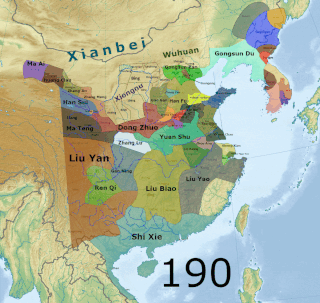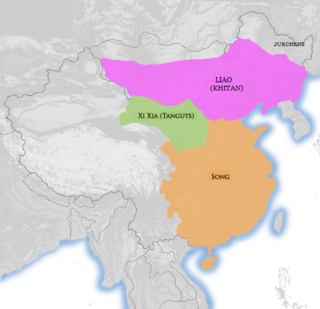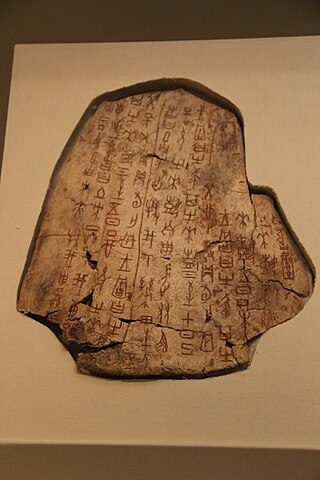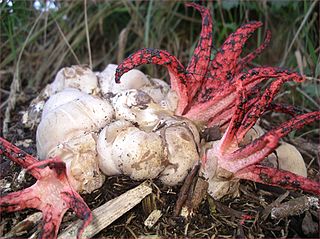
Turandot is an opera in three acts by Giacomo Puccini to a libretto in Italian by Giuseppe Adami and Renato Simoni. Puccini left the opera unfinished at the time of his death in 1924; it premiered in 1926 after the music was posthumously completed by Franco Alfano.

The Three Kingdoms of Cao Wei, Shu Han, and Eastern Wu dominated China from 220 to 280 AD following the end of the Han dynasty. This period was preceded by the Eastern Han dynasty and followed by the Western Jin dynasty. Academically, the periodisation begins with the establishment of Cao Wei in 220 and ends with the conquest of Wu by Jin in 280. The period immediately preceding the Three Kingdoms from 184 to 220 was marked by chaotic infighting among warlords across China as Han authority collapsed. The period from 220 to 263 was marked by a comparatively stable arrangement between Cao Wei, Shu Han, and Eastern Wu. This stability broke down with the conquest of Shu by Wei in 263, followed by the usurpation of Cao Wei by Jin in 266, and ultimately the conquest of Wu by Jin in 280.

The Western Xia or the Xi Xia (Chinese: 西夏; pinyin: Xī Xià; Wade–Giles: Hsi1 Hsia4), officially the Great Xia (大夏; Dà Xià; Ta4 Hsia4), also known as the Tangut Empire, and known as Mi-nyak to the Tanguts and Tibetans, was a Tangut-led Buddhist imperial dynasty of China that existed from 1038 to 1227. At its peak, the dynasty ruled over modern-day northwestern China, including parts of Ningxia, Gansu, eastern Qinghai, northern Shaanxi, northeastern Xinjiang, and southwest Inner Mongolia, and southernmost Outer Mongolia, measuring about 800,000 square kilometres (310,000 square miles).

Phallaceae is a family of fungi, commonly known as stinkhorns, within the order Phallales. Stinkhorns have a worldwide distribution, but are especially prevalent in tropical regions. They are known for their foul-smelling, sticky spore masses, or gleba, borne on the end of a stalk called the receptaculum. The characteristic fruiting-body structure, a single, unbranched receptaculum with an externally attached gleba on the upper part, distinguishes the Phallaceae from other families in the Phallales. The spore mass typically smells of carrion or dung, and attracts flies, beetles and other insects to help disperse the spores. Although there is great diversity in body structure shape among the various genera, all species in the Phallaceae begin their development as oval or round structures known as "eggs". The appearance of Phallaceae is often sudden, as gleba can erupt from the underground egg and burst open within an hour. According to a 2008 estimate, the family contains 21 genera and 77 species.

Oracle bone script is the oldest attested form of written Chinese, dating to the late 2nd millennium BC. Inscriptions were made by carving characters into oracle bones, usually either the shoulder bones of oxen or the plastra of turtles. The writings themselves mainly record the results of official divinations carried out on behalf of the ruling Shang dynasty royal family. These divinations took the form of scapulimancy where the oracle bones were exposed to flames, creating patterns of cracks that were then subjected to interpretation. Both the prompt and interpretation were inscribed on the same piece of bone that had been used for the divination itself.

East Asian Madhyamaka is the Buddhist tradition in East Asia which represents the Indian Madhyamaka (Chung-kuan) system of thought. In Chinese Buddhism, these are often referred to as the Sānlùn school, also known as the "emptiness school", although they may not have been an independent sect. The three principal texts of the school are the Middle Treatise, the Twelve Gate Treatise, and the Hundred Treatise. They were first transmitted to China during the early 5th century by the Buddhist monk Kumārajīva (344−413) in the Eastern Jin Dynasty. The school and its texts were later transmitted to Korea and Japan. The leading thinkers of this tradition are Kumārajīva's disciple Sēngzhào, and the later Jízàng. Their major doctrines include emptiness (k'ung), the middle way (chung-tao), the twofold truth (erh-t'i) and "the refutation of erroneous views as the illumination of right views" (p'o-hsieh-hsien-cheng).
Liu Xuan is a former Chinese artistic gymnast. She competed in the 1996 and 2000 Olympic Games and won two Olympic medals, including gold on the balance beam in 2000. She was born in Changsha, Hunan.

Qingdao Hainiu Football Club is a Chinese professional football club based in Qingdao, Shandong, that competes in the Chinese Super League, the top tier of Chinese football. Qingdao Hainiu plays its home matches at the Qingdao Youth Football Stadium, located within Chengyang District. Their current owners are the privately owned cable manufacturers Qingdao Jonoon Group.
Chung Laung Liu, also known as David Liu or C. L. Liu, was a Taiwanese computer scientist. Born in Guangzhou, he spent his childhood in Macau. He received his B.Sc. degree in Taiwan, master's degree and doctorate in the United States.

Clathrus is a genus of fungi of the family Phallaceae, the stinkhorn fungi. Mature fruit bodies are covered with olive-brown slimy gleba, containing spores, that attract flies. These fungi are saprobic and are common in mulch.

Clathrus archeri, commonly known as octopus stinkhorn or devil's fingers, is a fungus which has a global distribution. This species was first described in 1980 in a collection from Tasmania. The young fungus erupts from a suberumpent egg by forming into four to seven elongated slender arms initially erect and attached at the top. The arms then unfold to reveal a pinkish-red interior covered with a dark-olive spore-containing gleba. In maturity it smells like putrid flesh.

Clathrus ruber is a species of fungus in the family Phallaceae, and the type species of the genus Clathrus. It is commonly known as the latticed stinkhorn, the basket stinkhorn, or the red cage, alluding to the striking fruit bodies that are shaped somewhat like a round or oval hollow sphere with interlaced or latticed branches. The species was illustrated in the scientific literature during the 16th century, but was not officially described until 1729.

Clathrus columnatus, commonly known as the column stinkhorn, is a saprobic species of basidiomycete fungus in the family Phallaceae. Similar to other stinkhorn fungi, the fruiting body, known as the receptaculum, starts out as a subterranean "egg" form. As the fungus develops, the receptaculum expands and erupts out of the protective volva, ultimately developing into mature structures characterized by two to five long vertical orange or red spongy columns, joined at the apex. The fully grown receptaculum reaches heights of 8 cm tall. The inside surfaces of the columns are covered with a fetid olive-brown spore-containing slime, which attracts flies and other insects that help disseminate the spores.
The Hainan peacock-pheasant is an endangered bird that belongs to the pheasant family Phasianidae. This extremely rare species is endemic to the island of Hainan, China.
Clathrus hainanensis is a species of fungus in the stinkhorn family. Found in Hainan, China, it was described as new to science in 1998.

The Three-Body Problem is a story by Chinese science fiction author Liu Cixin, the first novel in the Remembrance of Earth's Past trilogy. The series portrays a fictional past, present and future wherein Earth encounters an alien civilization from a nearby system of three Sun-like stars orbiting one another, a representative example of the three-body problem in orbital mechanics.

Ken Liu is an American author of science fiction and fantasy. Liu has won multiple Hugo and Nebula Awards for his novel translations and original short fiction, which has appeared in F&SF, Asimov's, Analog, Lightspeed, Clarkesworld, and multiple "Year's Best" anthologies.
Liu Jinguo is a Chinese politician and public security official who is the current director of the National Supervisory Commission and a secretary of the Secretariat of the Chinese Communist Party. Since 2014 he has served as Deputy Secretary of the Central Commission for Discipline Inspection. Previously he held various senior posts at the Ministry of Public Security.
Liu Gang is a Chinese-born American aerospace engineer, computer scientist, optical physicist, political activist, and writer. He founded the Beijing Students' Autonomous Federation. He was a prominent student leader at the Tiananmen Square protests of 1989. Liu holds an M.A. in physics from Peking University and an M.A. in computer science from Columbia University. After his exile to the United States in 1996, Liu studied technology and physics at Bell Labs in New Jersey. Liu was employed at Morgan Stanley as a Wall Street IT analyst.
Liu Jun is a male singles badminton player from China.











